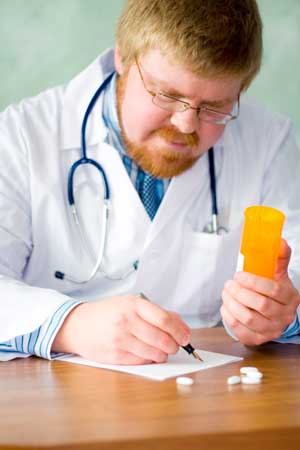Physician
Tasks & duties

Physicians may do some or all of the following:
-
examine patients referred to them by other doctors
-
identify and investigate medical problems
-
advise on medical treatment
-
discuss treatment with patients
-
give medical treatment
-
care for emergency referral patients, such as patients with critical illnesses, or those who have had strokes or acute heart attacks
-
check and record the progress of patients
-
teach medical students and other health professionals
Specialisations
Physicians may work in general medicine or specialise in a wide variety of areas. The following specialisations are recognised by the Royal Australasian College of Physicians:
Cardiology
Diseases of the heart.
Clinical Genetics
Disorders of the genes.
Clinical Pharmacology
The effects of drugs and management of drug therapy.
Endocrinology
Disorders of internal glands and hormones, including diabetes and thyroid disorders.
Gastroenterology and Hepatology
Diseases of the gut, liver and associated organs.
General Medicine
Diagnosis and management of conditions that maybe be complex, difficult to diagnose or involve multiple organs and systems of the body.
Geriatric Medicine
Management of illness and maintenance of health in aged people.
Haematology
Diseases of the blood.
Immunology and Allergy
Diseases affecting the immune system.
Infectious Diseases
Diseases caused by infections.
Intensive Care Medicine
Management of critically ill patients.
Neonatal/Perinatal Medicine
Care of the foetus, the premature and ill newborn.
Nephrology
Diseases of the kidneys.
Neurology
Diseases of the nervous system, including the brain.
Nuclear Medicine
The use of radioactivity for diagnosis, and occasionally, the treatment of illness.
Palliative Medicine
Management of people with terminal illnesses; emphasising the quality of life.
Rheumatology
Management of joint, muscle and soft tissue disorders.
Sleep Medicine
Diagnosis and management of sleeping and breathing disorders.
Thoracic Medicine
Management of lung disorders.
Skills & knowledge

Physicians need to have:
-
communication and people skills to relate well to patients and colleagues
-
knowledge of medicines and treatments and the effect these have on patients
-
knowledge of anatomy and how the human body works
-
knowledge of different diseases and illnesses
-
knowledge of how to access community organisations and support services
-
knowledge of medical ethics and law
-
up-to-date knowledge of new research, treatments and practices
-
analytical and interpreting skills
-
decision-making and problem-solving skills
-
organisational and time management skills
-
report writing skills
-
diagnostic skills
Entry requirements
To become a physician you need to complete a Bachelor of Medicine and Bachelor of Surgery (MBChB), then spend at least two years working as a junior house surgeon in a hospital. You must then complete three years of general internal medicine training and three years of specialist training and examinations to become a Fellow of the Royal Australasian College of Physicians (RACP).
Secondary education
A tertiary entrance qualification is required to enter further training. Useful subjects include Bursary or NCEA equivalent maths, chemistry, physics, biology and English.
Tertiary education
To do a MBChB you need to complete the first year of a Bachelor of Health Science or a Bachelor of Biomedical Science, and take the Undergraduate Medicine and Health Sciences Admission Test (UMAT) where up to one-third of your first-year final grade is determined by non-academic achievements.
Alternatively you can complete a related health sciences degree and apply for graduate entry to the MBChB programme. Graduate applicants must also take the UMAT.
Training on the job
Physicians must take part in continuing education courses through the Royal Australasian College of Physicians and are required to complete a number of educational credits every year. They also need to keep up to date with the latest technology and practices through reading medical journals and via the Internet.
Registration
Physicians need to be fellows of the Royal Australasian College of Physicians and hold vocational registration with the Medical Council of New Zealand.
Useful experience
Useful experience for physicians includes health work in New Zealand or overseas, or work with the Red Cross.
Related courses
Internal Medicine
Medical Science
Neuroscience
Obstetrics and Gynaecology
Paediatrics
Psychiatry
For more information, please refer to Career Services.
Document Actions
